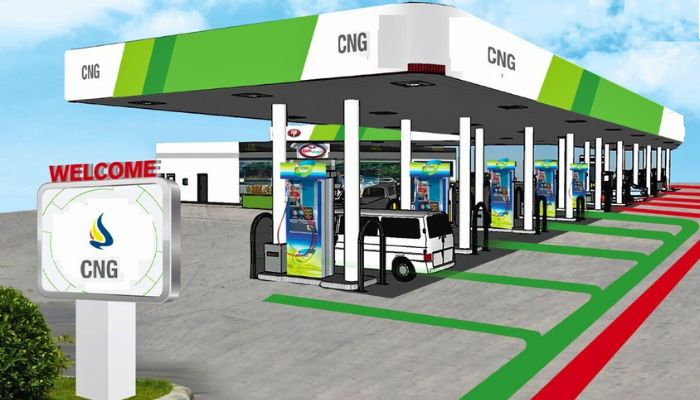As Nigeria’s petrol costs rise higher, occasioned by chronic fuel shortages, the need for a shift to more sustainable and cost-effective alternatives has become more pressing. A significant example of this shift is Nigeria’s Compressed Natural Gas (CNG) initiative, a program aimed at transitioning the country’s transport and energy sectors to natural gas in order to curb rising fuel costs, reduce environmental pollution and ensure long-term economic growth.
What You Should Know
CNG is not a new concept in Nigeria’s energy and transport ecosystem. In 2010, Nigeria Independent Marketing Company (NIPCO) launched the country’s first CNG for vehicular and sundry applications in Benin City. Since the removal of long-established petrol subsidies in May 2023 by President Tinubu, the use of CNG has gained significant attention as an alternative fuel source in the transport sector.
In August 2023, President Tinubu set up the Presidential Compressed Natural Gas Initiative (Pi-CNG), with a key objective of converting one million vehicles to CNG by the end of 2027.
On Thursday, Lagos State invited motorists in the state to seize the opportunity to convert their vehicles to CNG for free on Friday, September 13. The conversion, which is done on a first-come, first-served basis, will take place at six locations within the metropolis. The first 50 vehicles that pass inspection at any of the locations will be fitted with free conversion kits, allowing their owners to refuel at N230 pr SCM of CNG at any NIPCO station.
In the same vein, conversions will happen at several states in the southwest, including Abeokuta and Ibadan. In Abuja and Kaduna, conversions to CNG have been scheduled for September 14.
What is CNG?
Compressed Natural Gas (CNG) is a type of fuel composed mainly of methane, and is recognised as a cleaner, more efficient alternative to traditional fossil fuels such as petrol and diesel. Natural gas, from which CNG is derived, is a fossil fuel formed deep beneath the Earth’s surface over millions of years from the remains of plants and animals. It is extracted from gas fields and is often found in conjunction with crude oil deposits.
How is CNG used as energy?
It is often used in cars, buses, and trucks, especially for public transportation fleets and commercial vehicles. Vehicles that run on CNG are equipped with specially designed fuel storage tanks that hold the compressed gas. These tanks are built to withstand the high pressures needed to store the gas.
Beyond transportation, CNG can also be used in power generation, particularly in natural gas power plants. These plants burn natural gas to produce electricity, often using a combination of gas turbines and steam turbines in what is known as a Combined Cycle System.
In some countries, CNG is used for residential heating, cooking, and hot water systems.
Advantages of CNG
- Environmental Benefits: CNG produces significantly lower emissions of harmful pollutants compared to petrol and diesel. It reduces carbon dioxide emissions by about 20–30%, making it a key player in combating climate change.
- Cost Efficiency: CNG is often cheaper than petrol and diesel, both in terms of per-unit energy and maintenance costs. Vehicles running on CNG experience less wear and tear due to the cleaner combustion process, which results in longer engine life and lower maintenance expenses.
- Energy Security: CNG offers a way for countries with large natural gas reserves, such as Nigeria, to reduce their dependence on imported refined petroleum products, enhancing energy security and fostering local economic growth.
In the long run, Nigeria’s CNG initiative has the potential to transform its transportation sector, reduce the country’s carbon emissions and position Nigeria as a leader in the global energy transition.
Nigeria is responding to rising petrol costs and fuel shortages by shifting towards more sustainable energy alternatives, particularly Compressed Natural Gas (CNG). The CNG initiative, launched originally in 2010 and gaining momentum following the removal of petrol subsidies in May 2023, aims to transition the country's transport sector to natural gas. This transition is designed to curb fuel costs, reduce environmental pollution, and ensure long-term economic growth. President Tinubu has set a goal to convert one million vehicles to CNG by the end of 2027, with free conversion initiatives already happening in several states.
CNG, composed mainly of methane, is a cleaner and more efficient alternative to petrol and diesel. It's used extensively in cars, buses, trucks, and for power generation. It offers significant environmental benefits by reducing harmful emissions, is more cost-effective, and enhances energy security by utilizing Nigeria's large natural gas reserves. Overall, the CNG initiative has the potential to significantly transform Nigeria's transportation sector, reduce carbon emissions, and position the country as a leader in the global energy transition.






